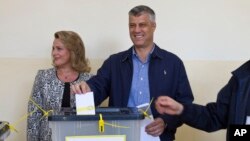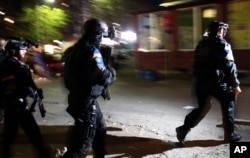Kosovo's prime minister has praised the local elections in northern Kosovo, which were marred by violence and low voter turnout.
Hashim Thaci said Sunday's voting in the Serb-majority areas was a historic step in efforts to integrate the north with the majority ethnic-Albanian country.
"This is the most important and historical step that Kosovo took since the declaration of independence, by creating a legal opportunity for integration and participation for all its citizens. More than 22 percent of citizens of that part [northern Kosovo] voted in a calm and democratic manner. The turnout would be much higher if isolated criminal groups didn't obstruct citizens, as a result several polling centers had to be closed earlier than scheduled."
Voting on Sunday was halted after a group of masked men broke into several schools housing polling stations in the town of Mitrovica, forcing the pull out of election monitors from the Organization for Security and Cooperation in Europe.
Serb nationalists had campaigned for a boycott, with some saying that voting would be an act of treason.
Many of the 40,000 ethnic Serbs living in northern Kosovo have refused to recognize the ethnic Albanian majority's 2008 secession from Serbia.
The government of neighboring Serbia had encouraged Kosovo's Serbs to vote in the election, marking a significant softening of its position toward the former Serbian territory, whose independence it still refuses to recognize.
Serbia agreed to support the Kosovo election in April as part of an EU-mediated deal between the two neighbors. The deal offered both sides the prospect of talks on joining the EU if the local vote went smoothly and drew a significant turnout of Serbs in northern Kosovo.
Both Serbia and Kosovo are seeking EU membership to boost their struggling economies.
Kosovo declared independence in 2008, a decade after it split from Serbia. The split triggered a bloody year-long conflict between Serbian and Albanian forces.
Hashim Thaci said Sunday's voting in the Serb-majority areas was a historic step in efforts to integrate the north with the majority ethnic-Albanian country.
"This is the most important and historical step that Kosovo took since the declaration of independence, by creating a legal opportunity for integration and participation for all its citizens. More than 22 percent of citizens of that part [northern Kosovo] voted in a calm and democratic manner. The turnout would be much higher if isolated criminal groups didn't obstruct citizens, as a result several polling centers had to be closed earlier than scheduled."
Voting on Sunday was halted after a group of masked men broke into several schools housing polling stations in the town of Mitrovica, forcing the pull out of election monitors from the Organization for Security and Cooperation in Europe.
Serb nationalists had campaigned for a boycott, with some saying that voting would be an act of treason.
Many of the 40,000 ethnic Serbs living in northern Kosovo have refused to recognize the ethnic Albanian majority's 2008 secession from Serbia.
The government of neighboring Serbia had encouraged Kosovo's Serbs to vote in the election, marking a significant softening of its position toward the former Serbian territory, whose independence it still refuses to recognize.
Serbia agreed to support the Kosovo election in April as part of an EU-mediated deal between the two neighbors. The deal offered both sides the prospect of talks on joining the EU if the local vote went smoothly and drew a significant turnout of Serbs in northern Kosovo.
Both Serbia and Kosovo are seeking EU membership to boost their struggling economies.
Kosovo declared independence in 2008, a decade after it split from Serbia. The split triggered a bloody year-long conflict between Serbian and Albanian forces.






